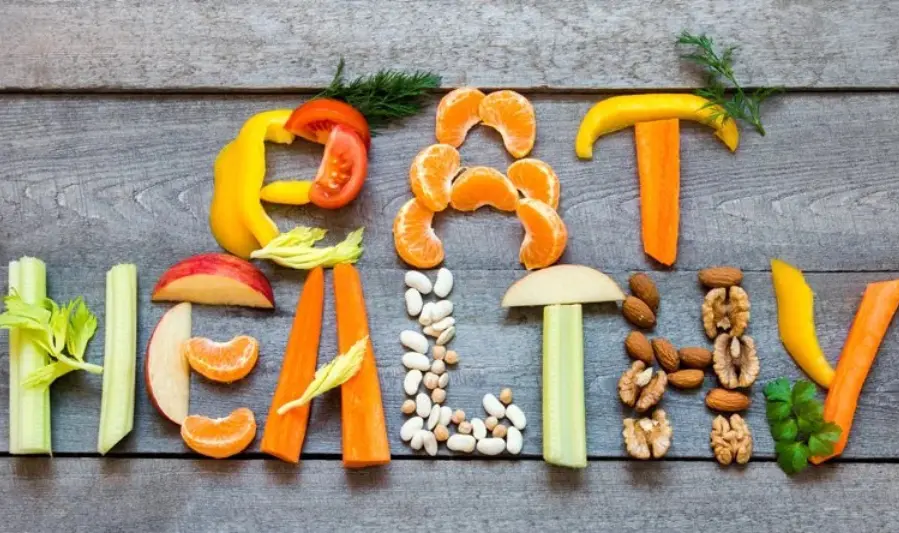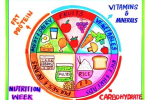Introduction
Developing simple eating habits is one of the easiest ways to improve your overall well-being. Small, consistent changes in your daily diet can lead to better energy, improved mood, and long-term health benefits.
A balanced diet influences how you feel, think, and perform throughout the day. The right foods can stabilize blood sugar, support brain function, and keep your body energized. When you choose nutritious meals regularly, you strengthen your immune system, maintain a healthy weight, and enhance your overall quality of life.
Why a Healthy Diet Matters

2.1 Improves Energy Levels
A nutritious diet helps maintain stable blood sugar, preventing energy crashes throughout the day. When your meals include balanced portions of carbs, protein, and healthy fats, your body performs better and stays energized for longer.
2.2 Supports Immunity
Eating nutrient-rich foods such as fruits, vegetables, nuts, and seeds strengthens the immune system. Vitamins, minerals, and antioxidants help the body fight infections and promote overall health.
2.3 Helps Maintain Healthy Weight
Balanced meals prevent overeating by keeping you full for longer. Including fiber, lean protein, and whole grains reduces unnecessary snacking and supports healthy weight management.
2.4 Enhances Digestion
Fiber-rich foods such as whole grains, vegetables, and legumes support gut health. They improve digestion, prevent constipation, and promote a healthy gut environment.
Core Principles of an Easy Diet Plan

3.1 Choose Whole Foods
Base your meals on natural, unprocessed foods such as fruits, vegetables, whole grains, nuts, and lean proteins. These foods provide essential nutrients, keep you fuller for longer, and support overall health.
3.2 Control Portion Sizes
Use the balanced plate method: half plate vegetables, one-quarter lean protein, and one-quarter whole grains or healthy carbs. Proper portion control prevents overeating and keeps calorie intake in check.
3.3 Stay Hydrated
Water plays a key role in digestion, energy levels, and appetite control. Aim for at least 6–8 glasses a day, adjusting based on activity and climate.
3.4 Reduce Processed Foods
Sugary drinks, fast food, fried snacks, and packaged items often contain excess salt, sugar, and unhealthy fats. Limiting these foods helps maintain stable energy, better weight, and improved long-term health.
3.5 Keep Regular Meal Timings
Eating at consistent times supports metabolism, prevents overeating, and stabilizes blood sugar levels. Regular meal routines also help with better digestion and improved daily performance.
Easy Daily Diet Plan
4.1 Breakfast Options
Start your day with nutrient-rich foods that provide steady energy. Good choices include oatmeal, boiled or scrambled eggs, yogurt bowls, and fresh fruits. These options are light, balanced, and easy to prepare.
4.2 Lunch Ideas
For lunch, focus on meals that combine lean protein, fiber, and healthy carbs. Options include grilled chicken with vegetables, mixed salads with beans or chickpeas, lentil dishes, or light soups that keep you full without heaviness.
4.3 Dinner Choices
Choose meals that are satisfying but easy to digest. Ideal options include baked or grilled fish, quinoa bowls, steamed vegetables, or tofu-based dishes. These help maintain energy while supporting overall health.
4.4 Healthy Snacks
Keep snacks simple and nutritious. Nuts, fresh fruits, hummus with vegetables, or homemade smoothies are excellent options for controlling hunger and boosting energy between meals.
Healthy Drink Choices
Water, Herbal Teas, Homemade Juices
Water should be your primary daily drink because it supports digestion, energy, and overall health. Herbal teas such as green tea, peppermint, or chamomile offer hydration along with antioxidants. Homemade juices made from fresh fruits and vegetables can be healthy when consumed in moderation, as they provide vitamins without artificial additives.
Drinks to Avoid
Try to limit beverages that add excess sugar or empty calories. These include soft drinks, packaged juices, sweetened coffee drinks, and energy drinks. Such drinks can lead to weight gain, blood sugar spikes, and reduced energy levels throughout the day.
Weekly Healthy Eating Tips
Meal Prepping
Plan and prepare your meals ahead of time to save effort during the week. Prepping ingredients or complete meals helps you avoid unhealthy last-minute choices and keeps your diet consistent.
Grocery Planning
Make a weekly grocery list based on your meals. Include whole foods like fruits, vegetables, lean proteins, whole grains, and healthy snacks. Planning helps you stay on budget and prevents buying unnecessary processed foods.
Balanced Plate Rule
Follow the balanced plate method for every meal: half plate vegetables, one-quarter lean protein, and one-quarter whole grains. This ensures proper nutrient distribution and controlled portions.
Smart Snacking
Choose snacks that provide real nutrition instead of empty calories. Options like nuts, fruits, yogurt, and roasted chickpeas keep you full and energized between meals.
Eating Colorful Foods
Add a variety of colorful fruits and vegetables to your meals. Each color offers different vitamins and antioxidants, helping support immunity, digestion, and overall wellness.
you may also like to read these posts:
Discover the Beauty of Indonesian Traditional Fashion Styles
Learn Java Easily Online with Simple Coding Examples
Easy Core Java Tutorials for Beginners to Start Coding
Beginner-Friendly Home Workouts: Simple Routines to Get Started
Common Mistakes to Avoid
Skipping Meals
Skipping meals can slow down your metabolism and lead to overeating later in the day. Regular, balanced meals help maintain steady energy and stable blood sugar levels.
Overeating Packaged Foods
Packaged foods are often high in sugar, salt, and unhealthy fats. Eating them frequently can lead to weight gain and low energy. Choose whole and fresh foods whenever possible.
Not Drinking Enough Water
Dehydration affects focus, digestion, and overall energy. Drinking too little water may also cause unnecessary hunger. Make hydration a daily priority.
Crash Dieting
Crash diets may show quick results but are not sustainable. They can cause nutrient deficiencies, muscle loss, and health issues. Slow, steady, and balanced eating habits work best for long-term health.
Faqs:
What is the simplest diet plan for a healthy lifestyle?
A simple plan includes whole foods like fruits, vegetables, whole grains, lean proteins, nuts, and plenty of water while avoiding sugary and processed items.
How many meals should I eat in a day for a healthy routine?
Most people benefit from 3 balanced meals with 1–2 healthy snacks, which helps maintain energy and prevents overeating.
Can I lose weight with an easy diet plan?
Yes. Eating balanced meals, controlling portions, and reducing sugary foods naturally help support weight management without strict dieting.
What should I drink instead of sugary sodas?
Healthier options include water, herbal teas, coconut water, lemon water, and fresh fruit-infused water.
Do I need to avoid all processed foods?
Not completely, but reducing heavily processed foods like chips, sugary snacks, and fast food can significantly improve energy and overall health.
Conclusion
Adopting an easy diet plan for a healthy lifestyle doesn’t require strict rules or complicated routines—just simple, consistent choices. By focusing on whole foods, staying hydrated, controlling portions, and eating regular balanced meals, you can improve your energy, support your overall health, and maintain a stable weight. Small changes made each day build long-term habits, helping you





